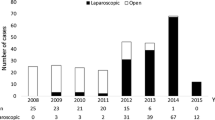Abstract
Introduction
While there are many reported advantages to laparoscopic surgery compared to open surgery, the impact of a laparoscopic approach on postoperative morbidity in obese patients undergoing rectal surgery has not been studied. Our goal was to determine whether obese patients undergoing laparoscopic rectal surgery experienced the same benefits as non-obese patients.
Methods
We identified patients undergoing rectal resections using the National Surgical Quality Improvement Project Participant Use Data File. We performed multivariable analyses to determine the independent association between laparoscopy and postoperative complications.
Results
A total of 26,437 patients underwent rectal resection. The mean age was 58.5 years, 32.6 % were obese, and 47.2 % had cancer. Laparoscopic procedures were slightly less common in obese patients compared to non-obese patients (36.0 vs. 38.2 %, p = 0.0006). In unadjusted analyses, complications were lower with the laparoscopic approach in both obese (18.9 vs. 32.4 %, p < 0.0001) and non-obese (15.6 vs. 25.3 %, p < 0.0001) patients. In a multivariable analysis controlling for potential confounders, the risk of postoperative complications increased as the degree of obesity worsened. The likelihood of experiencing a postoperative complication increased by 25, 45, and 75 % for obese class I, obese class II, and obese class III patients, respectively. A laparoscopic approach was associated with a 40 % decreased odds of a postoperative complication for all patients (OR 0.60, 95 % CI 0.56–0.64).
Conclusion
Laparoscopic rectal surgery is associated with fewer complications when compared to open rectal surgery in both obese and non-obese patients. Obesity was an independent risk factor for postoperative complications. In appropriately selected patients, rectal surgery outcomes may be improved with a minimally invasive approach.



Similar content being viewed by others
References
Baskin ML, Ard J, Franklin F, Allison DB (2005) Prevalence of obesity in the United States. Obes Rev 6:5–7
Ogden CL, Carroll MD, Kit BK, Flegal KM (2014) Prevalence of childhood and adult obesity in the United States, 2011–2012. JAMA 311:806–814
Cai Y, Zhou Y, Li Z, Xiang J, Chen Z (2013) Surgical outcome of laparoscopic colectomy for colorectal cancer in obese patients: a comparative study with open colectomy. Oncol Lett 6:1057–1062
Hourigan JS (2011) Impact of obesity on surgical site infection in colon and rectal surgery. Clin Colon Rectal Surg. 24:283–290
Senagore AJ, Delaney CP, Madboulay K, Brady KM, Fazio VW (2003) Laparoscopic colectomy in obese and nonobese patients. J Gastrointest Surg 7:558–561
Mahmood T (2013) Laparoscopic surgery in obese women. In: Obesity a ticking time bomb for reproductive health. Elsevier, London, pp. 571–582
Greenblatt DY, Rajamanickam V, Pugely AJ, Heise CP, Foley EF, Kennedy GD (2011) Short-term outcomes after laparoscopic-assisted proctectomy for rectal cancer: results from the ACS NSQIP. J Am Coll Surg 212:844–854
Wilson MZ, Hollenbeak CS, Stewart DB (2014) Laparoscopic colectomy is associated with a lower incidence of postoperative complications than open colectomy: a propensity score-matched cohort analysis. Colorectal Dis 16:382–389
Kiran RP, El-Gazzaz GH, Vogel JD, Remzi FH (2010) Laparoscopic approach significantly reduces surgical site infections after colorectal surgery: data from national surgical quality improvement program. J Am Coll Surg 211:232–238
Lai JH, Law WL (2012) Laparoscopic surgery for colorectal cancer. Br Med Bull 104:61–89
ACS NSQIP (n.d.) Retrieved January 10, 2015, from https://www.facs.org/quality-programs/acs-nsqip/about
Scheidbach H, Benedix F, Hugel O, Kose D, Kockerling F, Lippert H (2008) Laparoscopic approach to colorectal procedures in the obese patient: risk factor or benefit? Obes Surg 18:66–70
Hasson AM (2011) Risk of pneumoperitoneum in obese: old myths and new realities. World J Laparosc Surg 4:97–102
Pikarsky AJ, Saida Y, Yamaguchi T, Martinez S, Chen W, Weiss EG et al (2002) Is obesity a high-risk factor for laparoscopic colorectal surgery? Surg Endosc 16:855–858
Kitching AJ, O’Neil SS (2009) Fast-track surgery and anaesthesia. Contin Educ Anaesth Crit Care Pain 9:39–43
Martin ST, Stocchi L (2011) Laparoscopic colorectal resection in the obese patient. Clin Colon Rectal Surg 24:263–273
Jones OM, Lindsey I, Cunningham C (2011) Laparoscopic colorectal surgery. BMJ 28:343
Belizon A, Sardinha CT, Sher ME (2006) Converted laparoscopic colectomy: what are the consequences? Surg Endosc 20:947–951
Gervaz P, Pikarsky A, Utech M, Secic M, Efron J, Belin B et al (2001) Converted laparoscopic colorectal surgery. Surg Endosc 15:827–832
Tekkis PP, Senagore AJ, Delaney CP (2005) Conversion rates in laparoscopic colorectal surgery: a predictive model with, 1253 patients. Surg Endosc 19:47–54
Gonzalez R, Smith CD, Mason E, Duncan T, Wilson R, Miller J et al (2006) Consequences of conversion in laparoscopic colorectal surgery. Dis Colon Rectum 49:197–204
Funding
Clinical and Translational Science Award #UL1TR000071, NIH T-32 Grant # 5T32DK007639, and AHRQ Grant #1R24HS022134.
Author information
Authors and Affiliations
Corresponding author
Ethics declarations
Disclosures
Gabriela M. Vargas, Eric P. Sieloff, Abhishek D. Parmar, Nina P. Tamirisa, Hemalkumar B. Mehta, and Taylor S. Riall have no conflict of interest or financial ties to disclose.
Rights and permissions
About this article
Cite this article
Vargas, G.M., Sieloff, E.P., Parmar, A.D. et al. Laparoscopy decreases complications for obese patients undergoing elective rectal surgery. Surg Endosc 30, 1826–1832 (2016). https://doi.org/10.1007/s00464-015-4463-8
Received:
Accepted:
Published:
Issue Date:
DOI: https://doi.org/10.1007/s00464-015-4463-8



